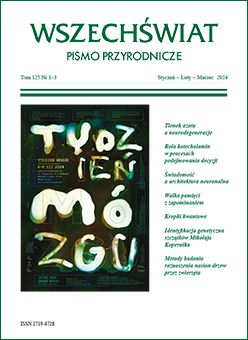Abstract
Memory is a basic property of the mind that helps us navigate the external world, bending it to our needs and is also an inherent element of our personality. It is known that remembering is an universal process, encompassing not only humans, but also the entire animal world. Every piece of information is saved in the brain and regardless of the nature of the new information and what senses registered it, it will be saved in our brain in the form of the so-called memory trace (engram).
The mechanisms of memory formation have been the subject of research for a long time. Research conducted on remembering processes has allowed us to classify memory depending on how long it is stored and how it manifests itself in our behavior. The basic molecular mechanisms of memory formation and consolidation in the form of a memory trace (engram) were also learned. Despite this, many issues related to memory are still not clarified and therefore memory and the causes and mechanisms of its disorders are still the subject of intensive research.
Much less attention has been paid to research on the mechanisms of forgetting, although the main goal of research conducted to better understand memory formation was to understand these mechanisms sufficiently to prevent memory disorders and forgetting.
Recently, many publications have appeared on this topic of forgetting, treating this process from different perspectives. Careful study of the process of forgetting has become important due to the increasing incidence of neurodegenerative diseases associated with memory loss and the extension of people's lives and age-related memory problems.
From the point of view of the mechanisms of this process, forgetting can be perceived as an error occurring in the process of storing information, disruption in access to remembered information or damage to memory traces.
It has become important to prevent forgetting and keep memory in good shape, not only thanks to the constantly emerging new pharmaceuticals, but also by exercising memory by providing new stimuli and impressions or acquiring new skills to force the brain to work better and more intensively. In this way, it can keep the neural information network in better shape, provide easy access to remembered information and help memory overcome forgetting.

